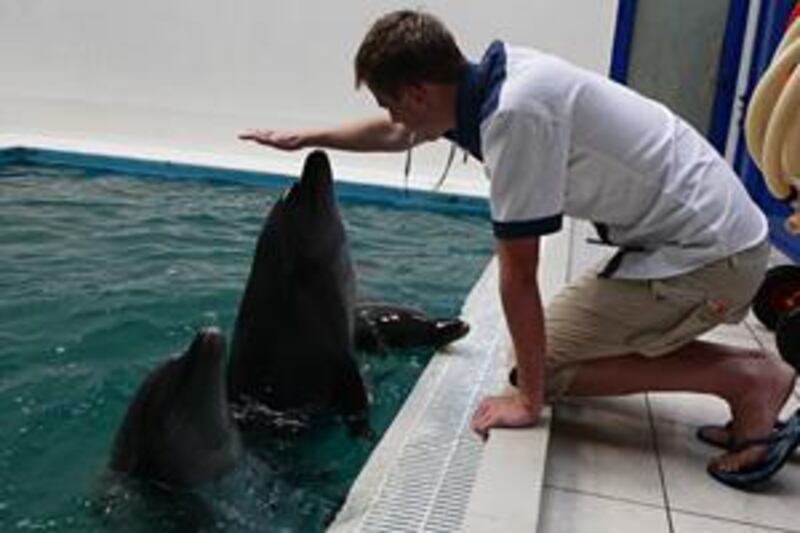DUBAI // Tommy Wilken laughed as he stood beside the pool at Dubai Dolphinarium's quarantine holding pen and watched the aquarium's competitive new arrivals try to out-jump each other. Fekoa and Tetka, both 15, Bubbles, seven, and Jerry, five, all captive-bred bottlenose dolphins imported from a Japanese aquarium three months ago, took turns diving through the air - each time a little higher than the last.
"We've been training with them and they seem to enjoy it," Mr Wilken said as Jerry and Bubbles approached the side of the pen to greet him. The South African expatriate and animal behaviour specialist, 24, started working with dolphins when he was just 13. Having moved to Dubai 18 months ago, after a short spell at Atlantis, The Palm, he began work at Dubai Creek Park's aquarium as one of two full-time dolphin trainers.
For the past three months he and his colleague Traill Stocker have been working around the clock to ensure the four dolphins settle in to their new home. The dolphins, when prepared, will join the daily programmes for spectators. Acclimatising and training the beautiful mammals, Mr Wilken said, was a time-consuming, sometimes frustrating, but always rewarding experience. "They are extremely hormonal animals. Even the food you feed them can trigger their hormones. There are times when they don't listen at all. We just have to wait.
"When they begin to mate, for example, there is nothing we can do but accept that they are dolphins and not robots." During the past three months, Mr Wilken and Mr Stocker have carried out regular health checks and spent hours closely observing the four to ensure they get on well as they establish their social structure. "They choose who will be the dominant mammal, the leader," Mr Wilkin said. "We simply observe it and our training is then based around that structure."
This would include always rewarding the leader first to ensure no fights break out. "Fighting is very common among dolphins," he said. "They are rough, not the soft animals they have been marketed as. At the end of the day, I know that if I'm going next to the pool this is a wild animal and I have to pay attention to every part of its behaviour." High-pitched whistles, tail-slapping on the water or jerky head movements can all be precursors of aggression. The dolphins receive ongoing training to ensure they are fit for the daily programmes and "swim with the dolphins" sessions. More importantly, the exercise keeps them relaxed during routine medical tests and means they get regular mental and physical stimulation - especially important when living in a tank or pool.
They train for 60 to 90 minutes a day. Males, Mr Wilken said, were more difficult to train. "We do not teach them tricks. We don't have them jumping through fire hoops. Everything we do with them is an extension of their natural behaviour. "Jumping, belly flops, breaks, they do these things to remove parasites or to get at itches or scratches on their bodies," he said. A high-pitched whistle is used by the trainers to communicate. One short blast means: "Good, come back to me, you get a fish or a reward."
It is part of an American technique called "positive reinforcement through successive approximations", Mr Wilken said. It means all wanted behaviour is rewarded and bad behaviour is simply ignored. "We don't use punishment and they respond well," he said. "It's very good for the relationship between dolphin and trainer. We are their trainers but also their friend. We are a team." Training takes a lifetime and some things are easier to teach than others.
"If they don't want to take part we simply stop or move on to something else," Mr Wilken said. "There are some things dolphins simply don't like. Some don't like playing with a red ball even though they don't see colour. Others don't like to swim alone." The two trainers are now transferring their knowledge of animal management to dog owners in Dubai. Citing a recent client, Mr Wilken said: "There was one lady who called this week because her border collie was rounding up all of the children in her neighbourhood."
Mr Wilken and Mr Stocker use the same positive reinforcement and single voice command techniques to deal with problems from teething puppies to dogs showing aggression. "The difference is that we teach people how to be the trainers, to be aware of things, because we are not there consistently training the dog." After 11 years working with dolphins Mr Wilken still enjoys it. "It never gets boring, it changes all the time. But it is a big commitment. There are times when you can go without a day off for five or six weeks - when a new dolphin arrives. It is a very intense relationship. I put more hours in at work than I do at home. It is my life. But I love it."
@Email:loatway@thenational.ae






